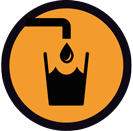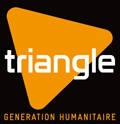AREA OF EXPERTISE

Water, hygiene and sanitation

AREA OF EXPERTISE

Water, hygiene and sanitation
FUNDING
This programme complements an action currently implemented by TGH with the financial support of EuropeAid in Central Darfur, in Bindizi and Um Dukhun. It continues and expands the Water Hygiene and Sanitation (WHS) activities carried out by TGH in West Darfur and Central Darfur, integrating two new areas of intervention in West Darfur: the city of Foroboranga and five villages neighbouring Geneina. This action mainly targets internally displaced people, returnees and other groups affected by the conflict. Special attention is paid to the most vulnerable, who have little or no access to water and sanitation infrastructures, and to children in general.
Four main areas make up this programme: access to clean drinking water, sanitation, management of water and sanitation infrastructures, and promotion of good hygiene practices.
Regarding access to drinking water and sanitation, the objective is to meet the urgent needs of the people newly displaced in the region of Central Darfur, and to provide an emergency response (construction and rehabilitation of water points, construction of latrines, etc.) to the water and sanitation needs of the displaced people, returnees and host communities in the West Darfur area
The activities already implemented in Bindizi, Um Dukhun and Geneina helped achieve or exceed SPHERE standards in water and sanitation (more than twelve liters of drinking water per person are now available). However, the mass influx of newly displaced people has increased populations' needs, requiring the installation of new pumps and new wells. The new intervention areas (Foroboranga and five rural villages surrounding Geneina) are facing a critical situation with SPHERE standards far from being achieved (less than one liter of drinking water available per person for the village of Galo, for example). Additionally; TGH wants to establish a Community Approach for Total Sanitation (CATS) to put an end to open defecation, the source of many diseases such as diarrhea and cholera.
The programme also plans to encourage local populations to take part in the water and sanitation infrastructure management project. With growing support from the Sudanese Water, Environment and Sanitation Department (WES), water point management committees have been established, training sessions for maintenance technicians have been organized, and a pricing system for the sustainable running of water points has been created. This programme will replicate these positive results in Central Darfur in the new areas of intervention.
Finally, the promotion of good hygiene practices, an essential component of this programme will be based on awareness-raising activities targeting the most vulnerable (women and children) to make them understand the link between hygiene practices and social development.